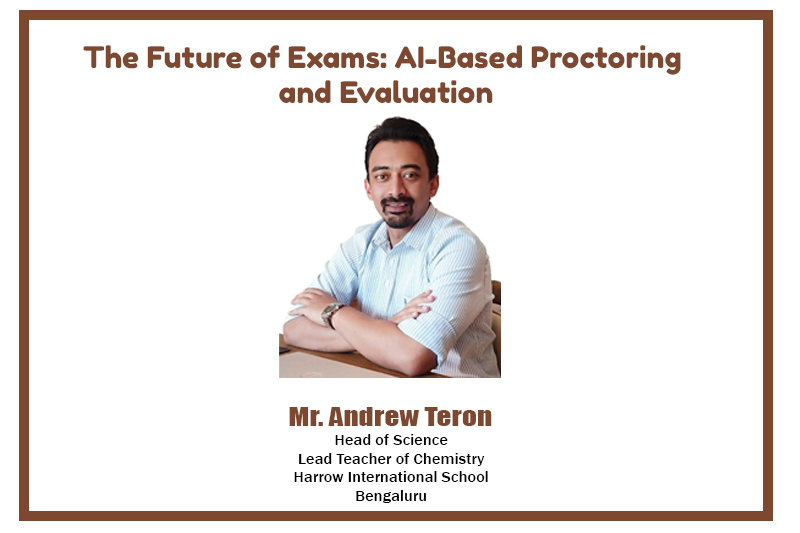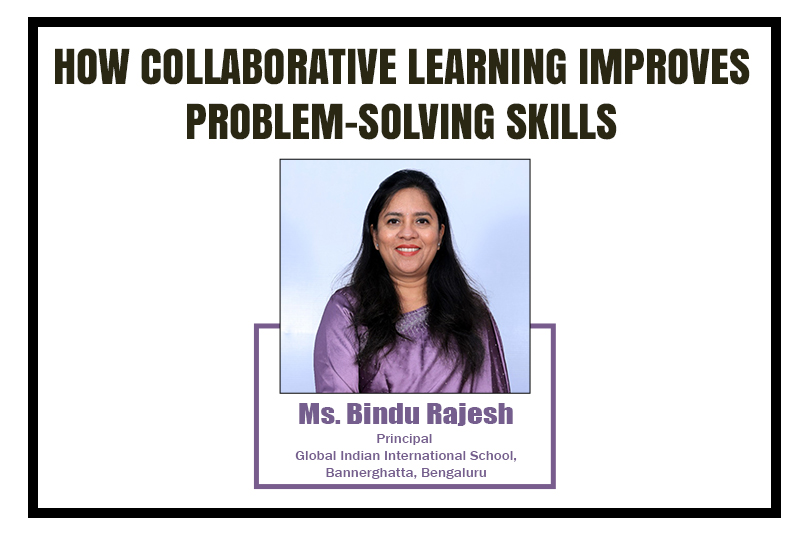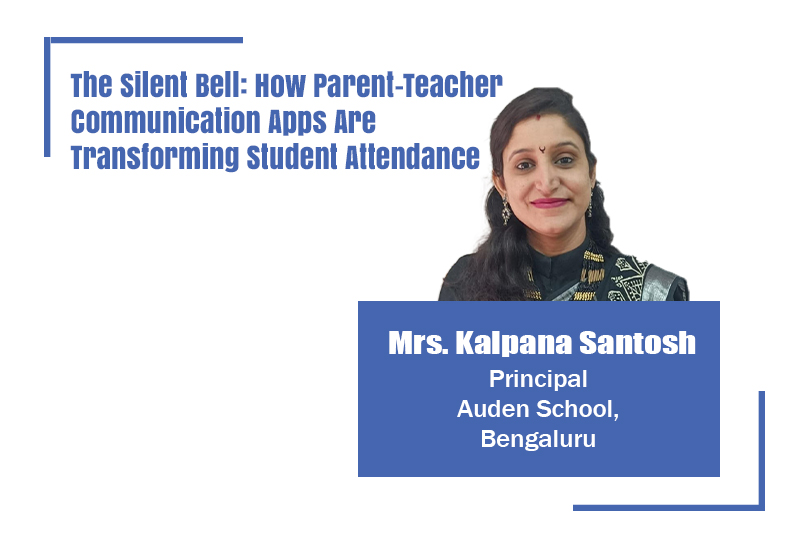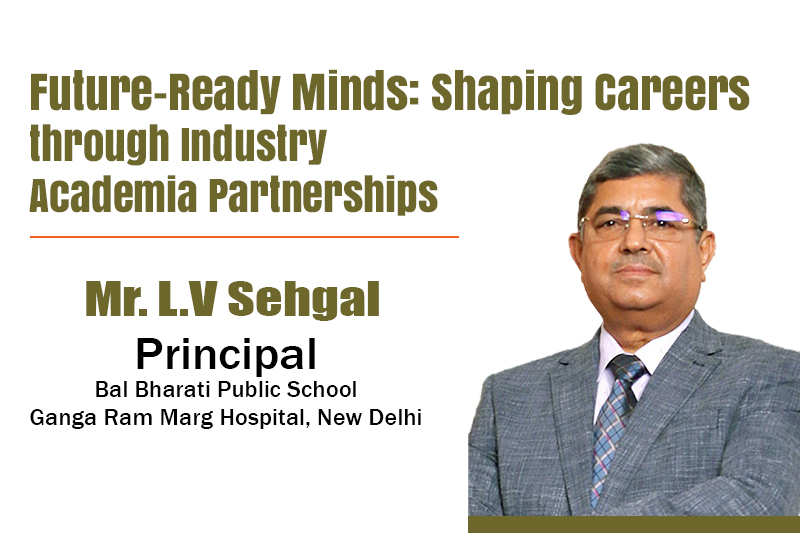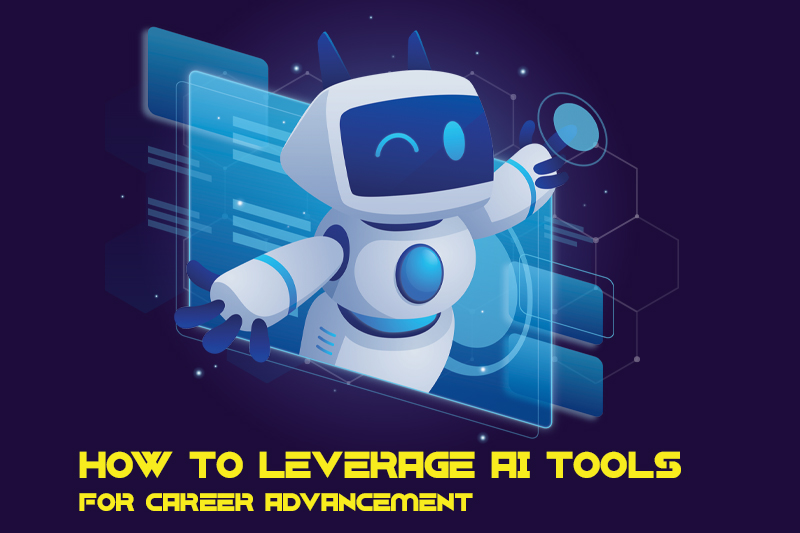The Future of Exams: AI-Based Proctoring and Evaluation at Harrow Bengaluru
Mr. Andrew Teron,
Harrow International School Bengaluru
Examinations have always been the backbone of formal education, measuring not only academic knowledge but also critical thinking and application skills. In today’s rapidly evolving digital learning ecosystem, traditional methods of exam monitoring and evaluation are increasingly being questioned for their scalability, fairness, and efficiency.
At the forefront of this transformation stands Harrow International School Bengaluru, where Mr. Andrew Teron, Head of Science and Lead Teacher of Chemistry, has been closely observing and implementing the integration of AI-based proctoring and AI-driven evaluation. With more than a decade of experience in international curricula such as IBDP, Cambridge A Levels, and IGCSE, Mr. Teron highlights how artificial intelligence in schools is revolutionizing the way assessments are conducted and evaluated.
AI-Based Proctoring: Redefining Exam Security
As Mr. Teron emphasizes, one of the greatest challenges in education today is ensuring exam integrity in both hybrid and online settings. Traditional invigilation methods—whether physical or remote—depend heavily on human supervision, which is resource-intensive and prone to inconsistency.
Here, AI-based proctoring offers a game-changing solution. With tools such as facial recognition, gaze tracking, behavioral analytics, and environmental noise detection, AI creates a consistent and scalable framework for monitoring. These systems can automatically flag suspicious activity, log potential misconduct, and generate detailed reports for educators to review.
In his view, this not only preserves fairness but also reduces the psychological burden on students who might otherwise feel over-monitored under human surveillance. Instead, AI monitoring functions in the background, making the process less intrusive while still maintaining exam security.
AI in Evaluation: Faster, Smarter, and Personalized
While AI-based proctoring ensures fairness during assessments, Mr. Teron points out that the real paradigm shift lies in AI exam evaluation.
Traditionally, teachers invest countless hours grading papers, balancing objectivity with meaningful feedback. For subjects like Chemistry, Physics, and Biology, where answers often require extended reasoning and detailed explanations, manual grading can be both time-consuming and inconsistent.
Through AI-powered assessments, however, the process is being reimagined. Using natural language processing (NLP) and machine learning algorithms, AI can now evaluate structured responses, align them with mark schemes, and even generate personalized feedback for students. The benefits are manifold:
- Faster turnaround times for exam results.
- Standardized grading, reducing examiner bias.
- Detailed analytics, showing learning gaps and strengths.
- Immediate feedback, allowing students to correct misconceptions quickly.
This does not mean teachers are sidelined. Rather, educators are freed from repetitive grading tasks and can focus on curriculum design, mentoring, and formative interventions—areas where human expertise remains irreplaceable.
The Human Element: Balancing AI with Teacher Judgment
Despite these advancements, Mr. Teron strongly advocates for a balanced approach. While AI offers precision and consistency, it cannot always capture the nuance of creative reasoning, experimental design, or contextual arguments.
For example, when assessing a science question requiring students to critique experimental data, the subtlety of a student’s reasoning often lies beyond what an algorithm can detect. Here, human judgment is essential.
Furthermore, Mr. Teron cautions against algorithmic bias. AI systems trained on narrow datasets may unintentionally reinforce inequities. To counter this, he stresses the importance of continuous auditing, diverse data sets, and transparent AI decision-making. Importantly, students must retain the ability to challenge or appeal automated grading decisions, ensuring fairness and accountability in the system.
Practical Applications at Harrow Bengaluru
At Harrow International School Bengaluru, AI integration is already in motion. Mr. Teron shares how the science department uses AI-supported tools to enhance both teaching and assessment.
- AI-powered platforms generate differentiated quizzes tailored to individual learning levels.
- Automated tools analyze student misconceptions and provide immediate, constructive feedback.
- Assessment banks and AI-driven simulations allow students to prepare more effectively, especially in content-heavy subjects like Chemistry and Biology.
By combining AI efficiency with the expertise of teachers, Harrow ensures that assessments remain rigorous, fair, and student-centered.
Beyond Exams: AI for Metacognitive Growth
One of the most exciting outcomes of AI integration, Mr. Teron observes, is the impact on student self-awareness. Using AI-generated performance insights, students at Harrow Bengaluru can now track their progress, identify weak areas, and set data-driven learning goals.
This fosters metacognitive skills, enabling learners to take ownership of their academic journey. In the school’s boarding context, where close mentoring is possible, AI insights help teachers guide students more effectively—blending technology with personalized care.
The Ethical Dimension: Safeguarding Trust
Harrow International School Bengaluru also prioritizes ethical AI use. Mr. Teron underlines three key commitments:
- Data privacy: Protecting sensitive student information.
- Transparency: Ensuring students and parents understand how AI tools function.
- Well-being focus: Preventing over-surveillance and stress while maintaining exam integrity.
This hybrid model—where AI serves as a partner rather than a replacement—supports the school’s mission of preparing globally competent, ethically grounded, and academically excellent students.
The Future of Exams: What Lies Ahead?
Looking forward, Mr. Teron envisions AI-based proctoring and AI-driven evaluation becoming an integral part of education worldwide. With advancements in AI grading, predictive analytics, and adaptive feedback systems, schools may soon be able to identify learning gaps before they widen, personalize student support, and ensure more equitable outcomes.
He believes the future of exams will not be defined by rote memorization but by application, creativity, and critical reasoning, supported by the efficiency of AI. Importantly, he reiterates that AI should never be seen as replacing educators but rather as augmenting their role in guiding, inspiring, and nurturing young minds.
Conclusion: Harrow’s Vision for AI in Education
At Harrow International School Bengaluru, the integration of AI-powered assessments, AI-based proctoring, and digital learning tools is not just a matter of keeping pace with technology—it is a commitment to reimagining education for the 21st century.
As Mr. Andrew Teron reflects, AI is helping build exam systems that are fairer, faster, and more personalized while empowering teachers to focus on the deeper aspects of learning. By embracing artificial intelligence thoughtfully and ethically, Harrow Bengaluru is preparing its students not just for academic success but for a future where adaptability, critical thinking, and innovation are key.
In essence, AI is not replacing the human touch—it is amplifying it, creating a learning environment where technology and teaching work hand in hand to shape the leaders, innovators, and problem-solvers of tomorrow.
